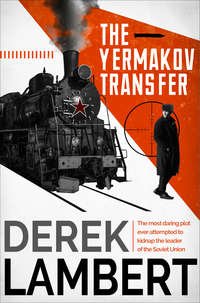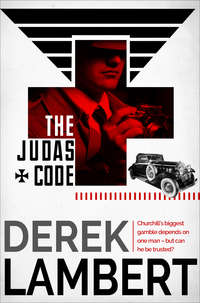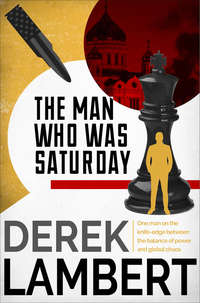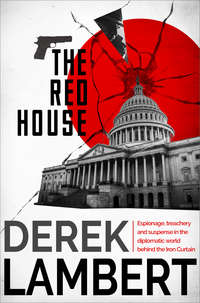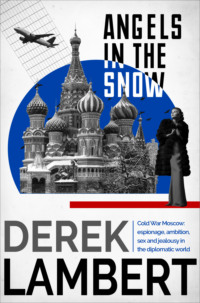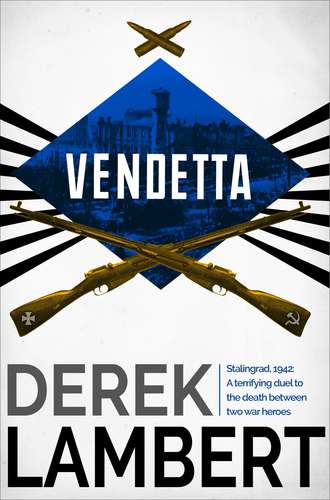
Полная версия
Vendetta

VENDETTA
Derek Lambert

COPYRIGHT
Collins Crime Club
An imprint of HarperCollinsPublishers Ltd.
1 London Bridge Street
London SE1 9GF
www.harpercollins.co.uk
First published in Great Britain by Hamish Hamilton Ltd 1986
Copyright © Derek Lambert 1986
Design and illustration by Micaela Alcaino © HarperCollinsPublishers Ltd 2018
Cover photographs © Shutterstock.com
Derek Lambert asserts the moral right to be identified as the author of this work
A catalogue record for this book is available from the British Library
This novel is entirely a work of fiction. The names, characters and incidents portrayed in it are the work of the author’s imagination. Any resemblance to actual persons, living or dead, events or localities is entirely coincidental.
All rights reserved under International and Pan-American Copyright Conventions. By payment of the required fees, you have been granted the non-exclusive, non-transferable right to access and read the text of this ebook on screen. No part of this text may be reproduced, transmitted, down-loaded, decompiled, reverse engineered, or stored in or introduced into any information storage and retrieval system, in any form or by any means, whether electronic or mechanical, now known or hereinafter invented, without the express written permission of HarperCollins ebooks
HarperCollinsPublishers has made every reasonable effort to ensure that any picture content and written content in this ebook has been included or removed in accordance with the contractual and technological constraints in operation at the time of publication
Source ISBN: 9780008268497
Ebook Edition © May 2018 ISBN: 9780008268497
Version: 2018-04-18
DEDICATION
For Jack and Nora, good neighbours
I am tired and sick of war. Its glory is all moonshine … War is hell.
Attributed to General Sherman in an address at Michigan University on June 19, 1879.
AUTHOR’S NOTE
In 1942 while savage fighting was at its height in Stalingrad two snipers, one Russian and one German, stalked each other among the ruins. In this prolonged duel within a battle each marksman became the embodiment of his country’s desperate designs. That much is fact; in the rest of the book, historical detail apart, the only truth is hope.
CONTENTS
Cover
Title Page
Copyright
Dedication
Author’s Note
Chapter One
Chapter Two
Chapter Three
Chapter Four
Chapter Five
Chapter Six
Chapter Seven
Chapter Eight
Chapter Nine
Chapter Ten
Chapter Eleven
Chapter Twelve
Chapter Thirteen
Chapter Fourteen
Chapter Fifteen
Chapter Sixteen
Chapter Seventeen
Chapter Eighteen
Epilogue
Keep Reading
About the Author
By the Same Author
About the Publisher
CHAPTER ONE
The young man cleaning his gun smelled cold, the true cold that is a prelude to snow, and was comforted. Snow was the white crib of security before the Army took him.
He peered over the rim of the shell-crater. To the east, across the Volga, beyond the smoke and dust of battle, the grey October sky was metallic-bright, but the breath of winter was unmistakable.
To a Siberian, that is.
Razin pulled him down to the planks laid in a square around the stove. ‘Have you gone crazy? Why don’t you do the job properly, stick a wreath on your helmet?’
‘He couldn’t see me.’ Antonov picked up his rifle and with a rag massaged yellow oil into the stock beneath the telescopic sight.
‘Couldn’t see you?’ Razin took a crumpled pack of papirosy from his faded brown tunic, squatted beside the stove and lit one from its flanks; specks of tobacco sparked and died on the glowing metal. ‘You have his eyes?’
‘There’s no cover for him out there.’ Antonov jerked his thumb in the direction of the mangled rail tracks, known to the Germans as the Tennis Racquet, separating the river from the tooth-stump ruins of Stalingrad.
Katyusha mortar rockets fired from the far bank of the Volga exploded in German-held rubble. A German field gun replied. Antonov longed for the snow-silence of the steppe or its stunned summer stillness or the breathing quiet of its nights.
‘And I suppose you know what he’s doing?’ Razin, an old soldier of twenty-eight, pulled at the ragged droop of his moustache and pushed his steel helmet onto the back of his cropped hair.
‘Eating probably. It’s lunchtime. Sausage? Bread? Maybe an apple if he’s lucky.’ Antonov removed a flake of ash from Razin’s cigarette from the barrel of the Mosin-Nagant.
‘Beer? Schnapps?’
‘No liquor. He needs a steady hand.’
‘Like you?’
‘Like me,’ Antonov agreed.
‘And he knows what you’re doing?’
‘If he were asked he’d probably answer: “Cleaning his gun.” It’s a good bet.’
‘You’re like twins and yet you want to kill each other.’
‘We don’t want to. We have to.’
‘I wonder.’ Razin, a Ukrainian with a furrowed smile and wary eyes who had been ordered to protect Antonov, rolled the creased cardboard tube of his yellow cigarette between thumb and forefinger. ‘Are you sure you don’t want to kill him?’
Antonov considered the question carefully. When he hunted animals – deer, elk, lynx – yes, he wanted to kill; that was sport and it was senseless to deny its pleasures. But to want to kill a man, no. Antonov shook his head vigorously. That was duty. ‘I’m sure,’ he told the Ukrainian.
‘You shook your head as if you wanted to get rid of your brains. A little too energetically, comrade?’
‘Meister’s special. Maybe that’s why I over-react.’
‘And the other Fritzes you killed … Weren’t they special to their parents, wives, girls?’
Antonov who had shot and killed twenty-three Germans since he arrived in Stalingrad three weeks earlier, each with one bullet, said: ‘You know what I mean.’
‘Maybe he wants to kill you.’
Did he? Antonov doubted it: Meister, with his special talents, was merely serving his country. Like me. Hitler instead of Stalin. It wasn’t until he had been ordered to kill Meister that it had occurred to him that the motives of enemies could be the same. The knowledge worried him. He placed his rifle on a plank, covering the sights with the rag.
A machine-gun coughed nearby and two soldiers jumped into the shell-hole. Razin cocked his pistol because when the enemy lines were only a couple of hundred metres away, when positions could be captured and recaptured within minutes, it was wise to check out visitors. They were both young, Slav faces smudged with exhaustion. One of them tugged a flask from his tunic, took a swig of vodka from it and passed it around. Russia’s fuel, Antonov thought. Where would we be without it?
‘You don’t drink firewater?’ The owner of the flask looked astonished.
‘When did you last eat?’ Antonov always tried to redirect attention from his abstinence.
‘Eat?’ The second soldier, once-plump cheeks sagging into pouches, used his hands like an actor. ‘This year perhaps: I can’t remember. When did we last eat, Sergei?’
‘I don’t know but these two look well fed.’ He touched a blood-stained bandage above his knee-length boot. ‘Why so glossy, comrades? Dead men’s rations?’
Razin, offering his cigarettes, said: ‘We’re privileged. In a classless society there’ll always be some of us. Or hadn’t you noticed?’
‘Are you political?’
‘You know better than that. Military commissars had their teeth drawn on October the ninth on the Boss’s orders.’
True, but Antonov could understand the soldier’s suspicion: although the commissars’ powers had been curtailed to reduce friction in the army, NKVD units were posted on the west bank of the Volga to stop the faint-hearted escaping to the safety of the east.
Was Razin in any way political? Antonov doubted it. During their brief but congested relationship Razin had emerged as an escapist, a stunted intellectual who had sought refuge from responsibility in the army.
Antonov reached into an ammunition box containing black bread, an onion, cheese and raw fish blown out of the Volga with hand-grenades.
The soldier with the pouched cheeks spoke to his colleague with his hand. ‘Careful,’ the hand said with a loose-wristed shake. ‘These men could be dangerous.’ But he took the food, pulling it apart with his fingers and handing the larger portion to his partner. They ate ravenously.
The machine-gun opened up again, a longer burst this time, welded explosions like ripping calico. More Katyushas. An aching pause. Then the cries of wounded men.
Razin swigged from the flask. ‘Good stuff.’ He wiped his mouth with the back of his hand.
‘The best,’ the soldier with the wounded leg agreed. ‘Ahotnichaya, hunters’ vodka.’
The cries of the wounded faded without arousing comment in the shell-hole. Suffering had become unremarkable and yet one soldier would still give another the larger of two crusts of bread. There were many values among the soldiery that puzzled Antonov. Indeed from the beginning it had been the relationships between men at war rather than the cannonade of battle that had disturbed him most. He found it difficult to share with them.
Hunger satisfied, the once-plump soldier became wary again; he reminded Antonov of a Bolshevik during the Revolution interrogating a prisoner suspected of Czarist sympathies, truculence tempered by grudging deference. ‘So,’ the soldier said, ‘where have you two been fighting? In the cookhouse?’
‘Nowhere much,’ Razin told him. ‘I was with the 258th Rifle Division in a small skirmish – the Battle of Moscow. Were you there?’
‘Rostov.’
‘Ah yes,’ Razin said. ‘You lost Rostov: we saved Moscow.’
‘We heard that when you saved Moscow the war was as good as over. What went wrong?’
The other soldier said: ‘Rostov was a victory,’ and when Razin laughed: ‘I mean it, Rostov was the turning point. It was after Rostov that Stalin said: “Not a step back.’”
‘And we haven’t taken any steps back?’
‘We’ll hold the bastards here. Stalingrad. This is the one.’
Razin, nipping the glowing tip off his cigarette and, pouring the residue of tobacco into a tin that had contained throat lozenges, said: ‘I was in Moscow when Panfilov’s men held the Fritzes.’
The two soldiers fell silent as Razin retold the story that had already acquired the lustre of a legend.
As the German offensive faltered outside Moscow in late 1941, nearly a year ago, twenty-eight anti-tank gunners commanded by an officer named Panfilov had defied the mailed fist of a panzer attack on the Volokolamsk Highway. They had fought with guns and grenades and petrol bombs and the political officer, mortally wounded, had grabbed a clutch of hand grenades and thrown himself under a German tank. The battle had lasted four hours. The Germans lost eighteen tanks and failed to break through.
Ah, such sacrifice. Even when Razin had finished the tale Rodina, Mother Russia, lingered in the crater and briefly Panfilov and his men with their petrol-filled bottles were more real than the outrage that was Stalingrad.
Razin said: ‘At the end of the battle for Moscow you couldn’t help feeling sorry for the Fritzes. It was so cold that the oil in their guns froze and the poor bastards were still wearing summer uniforms – greatcoats and boots if they were lucky – and when they went for a piss … snap!’ Razin picked up a splinter of wood and snapped it in half.
‘You felt sorry for the parasites?’ The soldier with the eloquent hands stared at Razin in disbelief.
‘Until I remembered what they had done to our people. Until I remembered the corpses strung up in the villages.’
‘The Fritzes might have been pissing icicles at Moscow,’ the soldier with the wounded leg remarked, ‘but when they first arrived in Stalingrad they were singing and playing mouth-organs.’ He turned to Antonov. ‘You don’t talk much, comrade. What do you think about Germans? Do you feel sorry for them?’
Antonov realised that the soldier thought he might be a Nazi sympathiser: the Red Army was obsessed with spies, and exhausted men saw them on the tattered fringes of their fatigue. But Antonov wasn’t sure what he felt about Germans. Occasionally during shell-splintered sleep, he saw young men harvesting golden wheat on the steppe or carving ice for drinking water from a frozen river or coaxing girls into the deep green depths of the taiga and the young men were neither Russians nor Germans.
When Antonov didn’t reply the other soldier, wagging one finger, asked: ‘Where are you from comrade? The Ukraine? I heard that when the Fritzes invaded last year a lot of Ukrainians fought for them.’
Razin prodded the barrel of his pistol towards the soldier. ‘I come from the Ukraine,’ he said.
‘You obviously decided to fight on the right side.’ The soldier regarded the pistol without fear. ‘But what I’m saying is true?’
‘A few joined the Germans,’ Razin admitted. ‘In Kiev, for instance, the people were bewildered. In the space of twenty years they had been occupied by Germans, Austrians, Reds, Whites, Poles … Maybe all they wanted was the use of their own backyard. And isn’t that what we’re all fighting for? One hell of a great backyard?’
The other soldier spread his hands in front of the incandescent stove. ‘That isn’t what Sergei asked. Where,’ nodding at Antonov, ‘do you come from?’
More Katyushas, Little Kates, exploded nearby. They made an awesome noise and the Germans called them Stalin Organs. For the Russians firing from the other side of the Volga it was easy enough to shell the Germans over their comrades’ heads; for the Germans it wasn’t so easy to pound the Russians because the Soviet positions were so compressed that there was always a risk that they would hit their own infantry.
‘Does it matter? We’re all Soviets.’ But to Antonov it did matter; the army had taught him that. Republics, regions, races … all harboured ancient hostilities.
The wounded soldier said: ‘A country boy by the look of you. Blue eyes, fair hair beneath that helmet … Or is it straw?’
Antonov drew a swastika on the dust on one of his tall boots. ‘Siberia,’ he said after a while. ‘A village near Novosibirsk.’
In fact it was fifty miles away from the city, a collection of wooden cottages with pink and blue fretted eaves, a pump and a wooden church that was used as a granary.
‘Well,’ the wounded soldier said, ‘you look as if you’ve had an easy war so far.’
Razin said: ‘Very easy. He’s only shot twenty-three so far. Two more won’t make much difference.’ He smiled crookedly at the two soldiers.
They began to understand, expressions tightening. ‘You’re not–’
Removing the rag from the telescopic sights of his rifle, Antonov said: ‘My name’s Yury Antonov,’ and, without pleasure, observed the effect of his name on the two visitors.
CHAPTER TWO
Leaning against the belly of a stricken locomotive, Karl Meister ate his lunch. Stale bread, sausage and a can of sliced peaches.
He wondered what Antonov was doing. Cleaning his rifle probably. If you weren’t eating or sleeping or shooting you were cleaning your rifle.
Katyushas exploded down the ruptured track near Univermag, the department store. They sounded like elephants bellowing. Fragments of metal struck the other side of the big black engine.
Cold eased its way down from the north. No teeth to it yet but when it really began its advance – next month according to the pundits – it would be inexorable. More than anything else the Sixth Army feared the cold: it had bitten the Wehrmacht to pieces outside Moscow.
Feeling its breath, Corporal Ernst Lanz, a thirty-year-old Berliner with a bald patch and a thief’s face, said: ‘We were supposed to have gobbled up this arschloch of a place in August.’
He was leaning against a piston drinking Russian beer from a fluted brown bottle. His grey-green tunic was stained but the Iron Cross 1st class on his chest shone brightly. His helmet, upturned, lay beside him like a bucket.
‘The generals didn’t reckon with street fighters,’ Meister said. ‘The Ivans would fight for a blade of grass – if there was any left.’
‘Stalingrad!’ Lanz threw aside the empty bottle. ‘Six months ago I’d never heard of it.’
‘I doubt whether the Führer had. No one expected a battle here. We thought we’d be half way across Siberia: the Russians thought they would be across the Dneiper.’
In Lanz’s presence Meister tried to compensate for his lack of battle experience with tactical hindsight and foresight. He doubted whether either was effective: not even shared adversity could dispel the suspicions separating classes: all they had in common was a city upbringing and even that was marred by Lanz’s low opinion of Hamburg.
He wondered how, given a common tongue, he and Antonov would hit it off if they hadn’t been ordered to kill each other. According to Soviet propaganda Antonov was the son of the soil, a Siberian. Would he want to socialise with a college boy?
‘So,’ Lanz said, taking a cigarette from a looted silver case and lighting it, ‘when are you going to start hunting each other again? What is this? A rest period?’
Meister swallowed the last slippery segment of peach. ‘When I’m ready,’ he said.
‘Supposing he gets ready first? Gets a bead on you from over there,’ pointing towards what was left of a warehouse.
‘He won’t, he’s not stupid, he knows I’d see him first silhouetted against the sky.’
‘That’s what you call instinct?’
‘Antonov has instinct. He was a hunter. I have aptitude.’
Aptitude, substitute for talent. Squinting through the sights of a Karabiner 98K on the college rifle range because he knew he could never excel at sport. Muscular co-ordination, that was what he had lacked but when it came to punching bullseyes with bullets he knew no equal and when he became a crack shot he had as many girls flirting with him as any lithe-limbed athlete, one girl in particular, Elzbeth, who had blonde hair like spun glass. He kept a photograph of her in his wallet, posing with him in Berlin when he won the Cadet Marksman of the Year award, he with his black hair glossy in the flashlights smiling fiercely over the rim of the enormous cup. Elzbeth said his face was sensitive. Some qualification for a sniper!
Lanz drew on his cigarette, cupped in his hand convict fashion. ‘Instinct versus aptitude … Which will win?’
‘You’d better pray for aptitude. If I lose, you lose and there’s no place in the Third Reich for losers.’
‘Don’t worry about me,’ Lanz said. ‘I’m a survivor. And if you want to survive take a few tips from me; that’s why we’re partners. Remember?’
‘I remember,’ Meister said.
‘So make your move when we launch the next attack on Mamaev Hill.’ They had lost count of how many times the hill commanding Stalingrad had changed hands. At the moment it was shared, a pyramid of rubble, exploded shells and corpses, some not quite dead. ‘You’ll have good cover. Smoke, shell-bursts. Tanks – T-34s or Panthers.’
Which, Meister thought, is exactly what Antonov will be anticipating. I might not know the arts of survival in battle but in this lone game I am Lanz’s master.
‘You don’t agree?’ Lanz asked.
‘It’s a possibility.’
‘I didn’t ask for this job.’
‘I couldn’t have done it without you. Survived this.’ Meister gestured at the desolation that had been a city.
‘When you’ve been running from the cops all your life you know a trick or two.’
‘Did you have any trouble getting into the Army? You know, with your record …’
‘I’m not a Jew, I’m not a gypsy. It was easy.’
‘But why’ Meister asked curiously, ‘did you want to fight?’
‘Who said I did? The Kripo had other plans for me if I didn’t.’ Lanz ground out his cigarette end and rubbed his bald patch with his hand leaving behind a grey smudge. ‘And you? Weren’t you too young to be conscripted?’
Meister who was now eighteen said: ‘I volunteered.’
A shelf of trophies, a head full of golden words. For the Fatherland. For the Führer. For Elzbeth.
‘Are you scared of dying?’ Lanz asked.
‘Aren’t we all?’
‘Some people beckon death. They call them heroes. Others dispatch people to their deaths. They call them politicians. But you haven’t answered my question.’
A Stuka dropped out of the sky, bent wings predatory, its pilot looking for Russians burrowing in the ruins, or ships crossing the Volga. An anti-aircraft gun opened up on the other side of the river.
‘I don’t want to die,’ Meister said.
‘Then you must kill Antonov.’
‘Of course.’ He saw Antonov with a ploughshare, its blades turning furrows of wet black earth.
A scout car stopped beside the stricken engine and a young officer with bloodshot eyes climbed out. ‘Are you Meister?’
Meister said he was.
‘The general wants to see you.’
‘The general?’
‘General Friedrich von Paulus.’ The officer looked as incredulous as Meister felt.
***
Paulus, commander of the Sixth Army that was laying siege to Stalingrad, sat at a trestle table beneath a naked light bulb in a command post, a cellar to the west of the city, poring over two maps. He didn’t look up when Meister clattered down the stone steps.
The larger map embraced the southern front. Meister could see the arrow-heads of Army Group A piercing the Caucasus, probing for its oil; above them the arrows of Army Group B trying to cut the Russians’ artery, the Volga, and amputate the great thumb of land that linked the Soviet Union with Turkey and Iran.
But the arrows lost direction at Stalingrad, the once prosperous city of half a million inhabitants. Stalingrad was the smaller map and, standing to attention opposite Paulus, Meister was able to view the plan of battle from the Soviet positions on the east bank of the Volga.
The plight of the Russians became more apparent in the cellar than it did above ground. Stalingrad was on the west bank and the Soviet forces there were encircled and divided. They were ferociously defending the industrial north and their slender waterside footholds, but nine-tenths of the city was in German hands.
At last the general leaned back in his chair and looked at Meister. Paulus had a long handsome face and big ears and his dark hair had been pressed close to his scalp by the peaked cap lying on the table. His uniform was loose on his body but he had presence. He was smoking a cigarette and there was a mound of crushed butts on a saucer.
‘So,’ he said, ‘you’re our latest hero.’ He appraised Meister as though looking for a hidden feature. ‘Well, we could do with one. Stand at ease, man.’ He picked up a copy of Signal. ‘Have you seen this?’ handing Meister the forces’ magazine.
‘No, Herr General.’ Meister found it difficult to believe that he was alone in a cellar with a general. He riffled the pages of the magazine until he saw Elzbeth and himself. It was the same photograph that he carried in his wallet.


